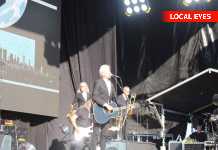Pressemeddelelse fra Folkekirkens Nødhjælp
Here, concrete examples and funding opportunities will inspire companies and NGOs to collaborate on climate adaptation solutions.
Worldwide, more than three billion peoples livelihoods are threatened by rising temperatures, according to the IPCC’s newest climate report. These people are not in a position to wait for the green transition.
They need immediate support to enhance climate-resistant agricultural production, digital warning systems and innovative irrigation solutions that are resilient towards extreme or unstable rainfall.
Currently, there is a significant global gap in funding for climate adaptation, and this cannot be filled by public climate finance alone. Therefore, there is a need to consider climate adaptation projects as a business case on an equal term with wind turbine projects and solar panel parks. But at the same time, a business case which will require close cooperation between multiple stakeholders, including companies, donors, and diplomats to mitigate the worst risks, as well as context-specific knowledge and cooperation with civil society in the Global south.
One example is the new partnership established between Danfoss, DanChurchAid and the Danish Ministry of Foreign Affairs which supports smallholder farmers in Kenya, who on average lose up to half of their food production due to inadequate storage and refrigeration.
Danfoss contributes with the provision of energy-efficient technology, investments in local value chains and cooperation with Kenyan companies on storage and cooling. DanChurchAid has the direct linkages to farmers and local communities and is responsible for training and capacity building of the farmers.
The project receives funding from the Danish Ministry of Foreign Affairs’ green market facility (Danida Green Business Partnership), which partakes in the extra risks associated with investments into Global south markets.
On the bottom line, the loss of food is reduced, earnings increase to the benefit of everyone – and the project contributes to climate adaptation of local food production.
The round table is chaired by DanChurchAid’s General Secretary Birgitte Qvist-Sørensen and the panel debate is moderated by Mette Vibe Utzon. Keynote speakers are:
- Dan Jørgensen, Minister for Development Cooperation and Global Climate Policy, Denmark
- Prof. Dr. Patrick V. Verkooijen, Chief Executive officer, Global Center for Adaptation (GCA)
- Thomas Bustrup, Deputy CEO, Confederation of Danish Industries
Birgitte Qvist-Sørensen, General secretary, DanChurchAid:
“Climate adaptation is a global challenge that cannot be solved through public climate finance alone. Rather, the issues at hand call for team efforts, where public, private sector and civil society actors join forces. As NGOs, we can contribute with our context-specific knowledge, our networks and partners and our expertise in climate change adaptation, which is a prerequisite for the investments to hit the right spot.”
Dan Jørgensen, Minister for Development Cooperation and Global Climate Policy, Denmark;
“The consequences of climate change are immense and devastating. Both public and private actors must become more involved to tackle the climate emergency. It includes finding additional investments to climate finance. The Danish Government is deeply committed to driving this agenda forward.”
Thomas Bustrup, Danish Confederation of Industries;
“The private sector plays a key role in climate adaptation. In order to increase private investments in adaptation projects, we need a twofold approach. On the one hand, we need to unveil the business case, illustrating climate related risks and that investments can increase supply chain security and generate concrete revenues. This can be fostered through better access to valid data and early engagement in National Adaptation Plans. On the other hand, we need clear framework conditions and risk hedging to increase investments in adaptation. Blended finance contributes to the sharing of risks and to build markets by enabling private investors to familiarise themselves with a new business model, region, or type of investee.”
Professor Patrick Verkooijen, Chief Executive Officer, Global Center for Adaptation (GCA):
“Right now, only 1.6% of all adaptation funding comes from the private sector. This is not nearly enough when the costs of adaptation are set to increase from $140 billion to $300 billion annually by 2030, with the potential to increase to $500 billion by 2050. Working together to finance, invest and create climate adaptation solutions is not a wasted effort or a sunk cost – it’s estimated the climate adaptation market could be worth $2 trillion per year by 2026. Without adaptation, climate change cost companies $1.26 trillion by 2026.”
The round table discussion takes place at DanChurchAid, Meldahlsgade 3, Copenhagen and online.
Unlocking private investments in adaptation (danskindustri.dk)
Kontakt:
Pressechef Poul Kjar tlf.: +45 41865975 email: pkja@dca.dk
Læs hele pressemeddelelsen på Via Ritzau her:
** Ovenstående pressemeddelelse er videreformidlet af Ritzau på vegne af tredjepart. Ritzau er derfor ikke ansvarlig for indholdet **









